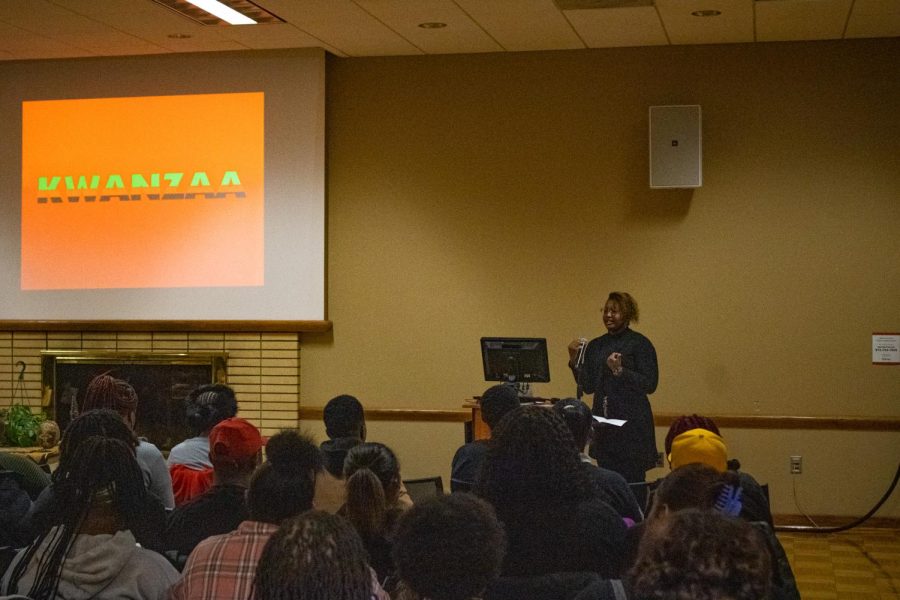The Center for Black Studies celebrate Kwanzaa, host farewell dinner for director
Gaylen Rivers, the assistant director of programming for the Center for Black Studies, explains the many traditions of the holiday. (Sean Reed | Northern Star)
December 12, 2022
Community, spirit and unity are at the heart of this cherished holiday tradition as people gathered on the evening of Dec. 1 for the Center for Black Studies pre-Kwanzaa celebration.
According to Gaylen Rivers, assistant director of programming at the Center for Black Studies, they decided to host this event early because Kwanzaa takes place over winter break, from Dec. 26 to Jan. 1, and they wanted students on campus to be able to participate in celebration and community.
“The celebration is focused on community and bringing people together,” Rivers said. “Kwanzaa was created by Dr. Maulana Karenga in 1966 to introduce and reaffirm seven basic values of African culture: unity, self-determination, collective work and responsibility, cooperative economics, purpose, creativity and faith.”
At the event, students and faculty were then shown a condensed celebration of the seven days of Kwanzaa. Each day represents one of the seven values.
According to Anne Edwards, director for the Center of Black Studies, at the beginning of Kwanzaa, you start by honoring those who came before, your ancestors and those who have died, by pouring water and repeating the phrase, “Ashay,” which roughly translates to “be with us.”
Afterward, the audience was treated to the ceremonial lighting of the candles, each one done by different student groups on campus, such as the NAACP, the Black Student Union, the Black Male Initiative and members of the John Henrik Clarke Honor Society.
Each group took turns explaining the meaning of the seven principles of kwanzaa. This was an interesting experience as the audience got a more thorough understanding of what the values represent and the proper way to pronounce them in Swahili, the original language they were written in.
In Swahili, they are: Umoja (unity), Kujichagulia (self-determination), Ujima (collective work and responsibility), Ujamaa (cooperative economics), Nia (purpose), Kuumba (creativity) and Imani (faith).
The celebration was a very fascinating mixture of history and tradition and it was nice to be able to participate in the rich cultural experience.
“It’s just such a cool thing to do. This is my second year doing it, and it’s so fun interacting with all the different programs we have at NIU,” said Britiany Wilson, a senior sociology major and president of the John Clarke Honor Society.
“For me, Kwanzaa is about coming together as one with friends and family, and that’s what we are doing here on campus,” said Wilson.
The event was well received and everyone had a great time enjoying the ceremony and learning more about the Kwanzaa traditions.
“I really captured a lot of information that I was not aware of. I really liked that I have the correct pronunciations for each (of the seven Kwanzaa) terms and learning the meaning of each of the candles,” said Taya Finner, a junior sociology major.
In the end, and as is Kwanzaa tradition, the night ended with Karamu Ya Imani or the Feast of Faith; this also doubled as a farewell dinner for Edwards, who will be leaving NIU after this semester.
“I may be leaving but everyone else will still be here. I know that the Center for Black Studies will continue the good work that we have been doing. I’m confident in that,” Edwards said.



